I just spent a week among aviation greatness at EAA AirVenture Oshkosh 2025. My time at the show was the best I’ve ever experienced to date, and even the camping was great, minus a couple of deeply entertaining hiccups. But one thing really bugged me, and it was how stupidly loud my generator was. I had realized that I had become the jerk with a loud generator, and it’s time to do something about it. Here’s how you can prevent yourself from making my mistake.
I bought my first-ever generator back in 2023. This unit is a Champion 4550 starting watt, 3650 running watt generator with a 30-Amp RV plug. I got it on sale for $350, and it has been my rock through three camping seasons. It has never failed me, even when I failed it by letting corn gas varnish in its carburetor. Seriously, this generator still runs even with a gummed-up carb!
I even love its longevity. This generator will easily run the electrical system of a large travel trailer for about 14 hours on five gallons of gas. That’s 14 hours of running an air-conditioner, too. This year, I forced the generator to run a 50-Amp camper, and again, it did it without even skipping a beat. If you look my generator up at stores like the Home Depot, you’ll see consistently high ratings of 4.5 to 5 stars, and I think the generator deserves it.
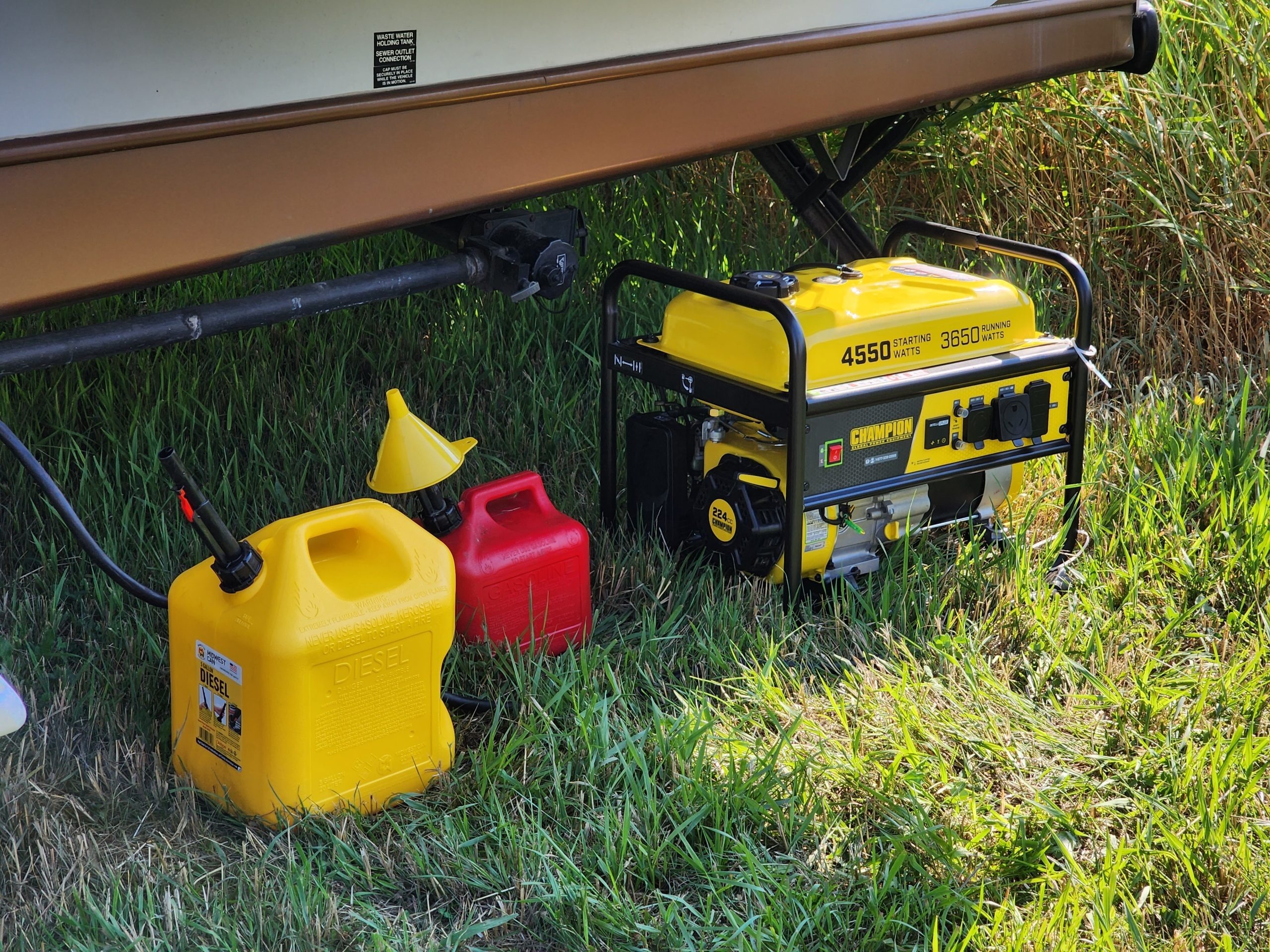
If I have any complaint with my generator, it’s with how loud the thing is. The Champion generator sounds like something that belongs in a construction site. It makes an extraordinary amount of mechanical noise in all directions. Understandably, my fellow campers have asked me to figure out a way to quiet the thing down, and I usually just block it with a truck or shut it off. After three seasons of using the thing, I finally have it figured out. At least to my ears, there are three realistic methods to quiet down a generator.
Before I continue, I’ll explain the very basic way that a generator works. These machines feature gasoline, propane, or diesel engines that turn a shaft, which powers an alternator. Power from the alternator is then fed to a control panel and outlets.
The Free Way
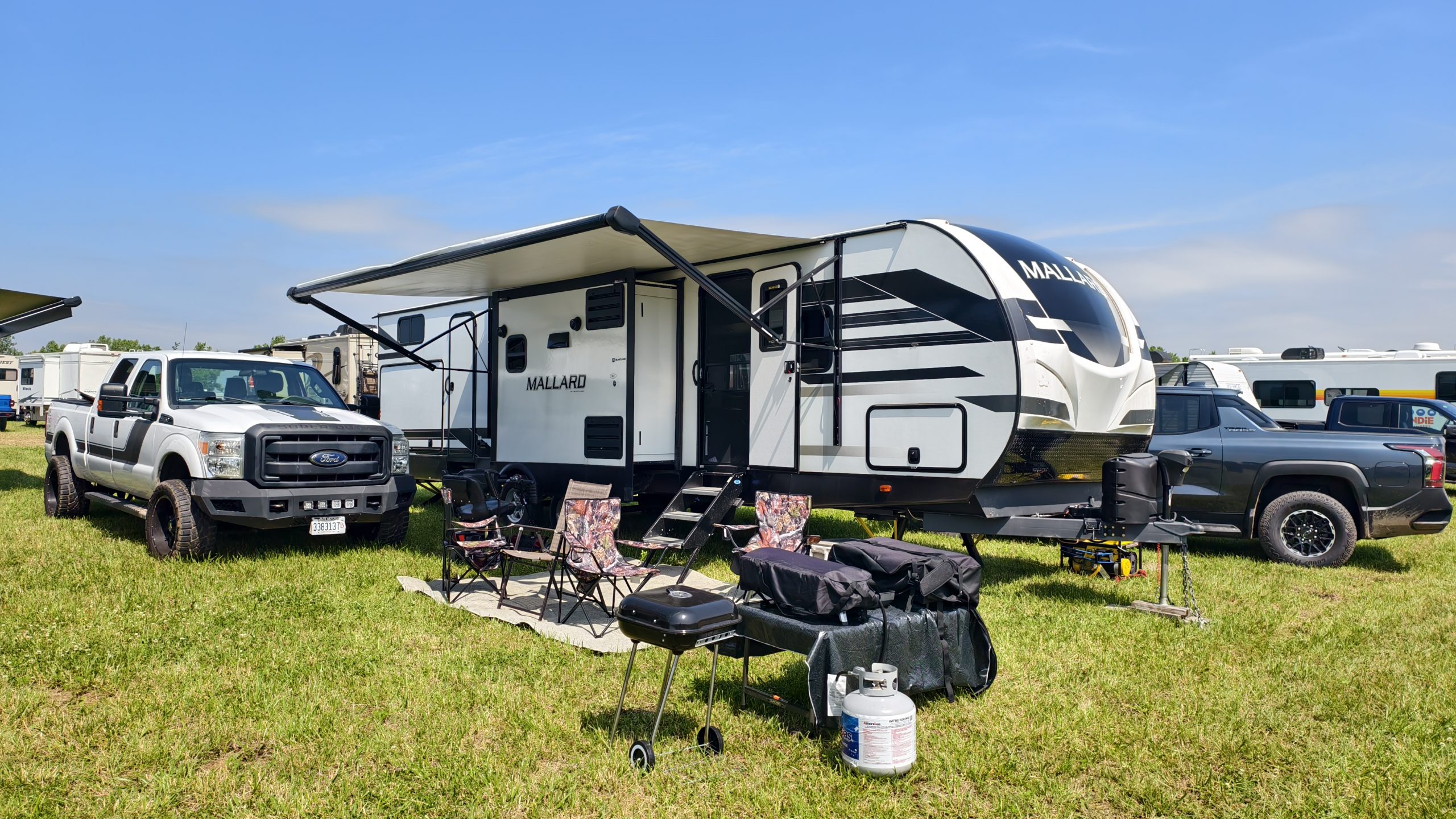
Usually, my AirVenture crew consists of Sheryl and me. In the past, I put the generator at the very back of the camper and we slept at the very front. This left us completely unbothered, as the distance was great enough to reduce the sound of the generator to a distant hum. However, our campsite neighbors hated the sound of the generator, so we usually killed it at night, even if we slept in the coveted 24-hour generator area. This worked out pretty well because our trailer had a very effective ceiling vent and fan that kept us relatively cool.
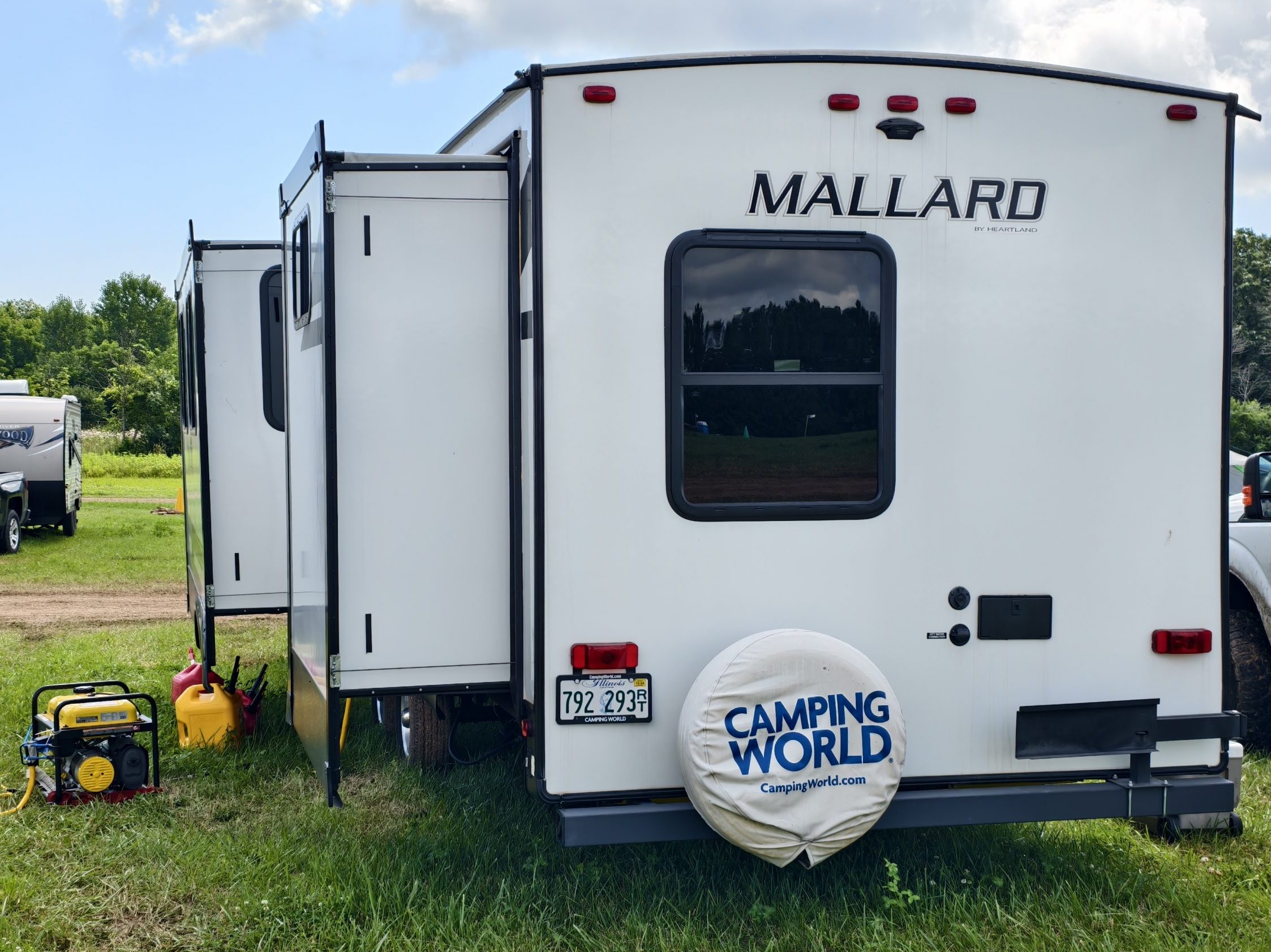
Not this year. I had my parents with me and we were traveling in their 2022 Heartland Mallard M33, which thanks to its poor design has almost no ventilation in the bedroom. If the air-conditioner is not running, you will cook like a chicken in a broiler. It gets so hot in there that I’ve awoken soaked in perspiration with my hair ruined from sweat.
If that wasn’t bad enough, my elderly mom gets really cold at night, so she likes to run the camper’s electric fireplace to keep warm. Yes, this trailer has a propane furnace, but she loves running the inefficient electric heater. My dad is like me, and likes things colder. The twist is that my dad took the rear of the camper as his room, and my mom took the living room in the middle of the camper as her room. This presented problem: Where do I put the generator?
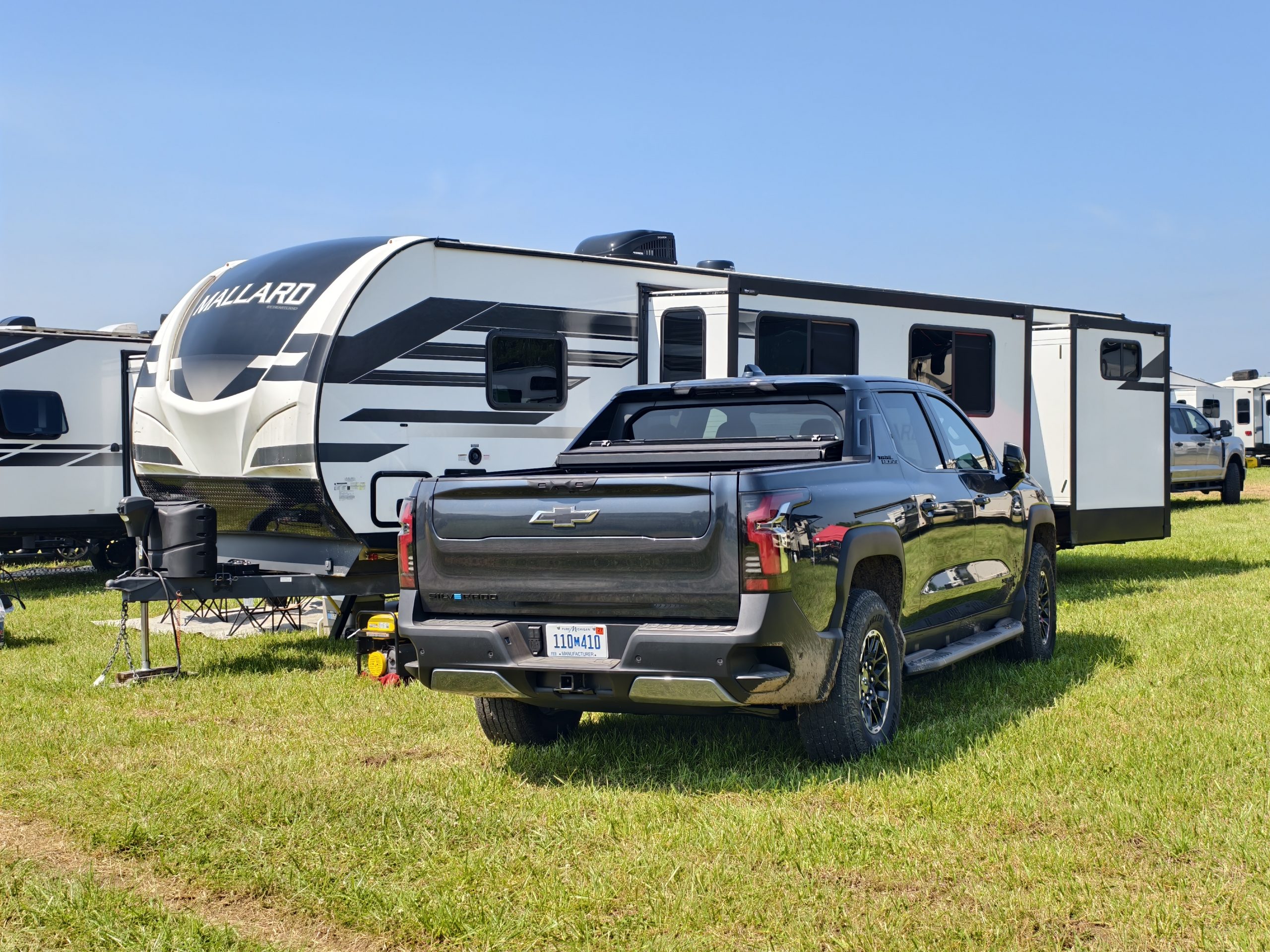
For the first half of the week, I put the generator in front of the camper and under the bedroom. Then, I parked the Chevy Silverado EV next to the generator. The truck blocked a lot of the noise on one side, while the camper blocked the noise above. Sound headed backward or to the right had to travel past the camper first. It wasn’t perfect, but nobody complained. It was shocking how much just blocking the generator with the truck worked to stifle its sound.
Sleeping over this setup, however, was terrible. The generator was basically only a few feet under my bed, and the poor insulation of a travel trailer meant that I heard the noise loud and clear. I woke up every time the generator’s RPM changed due to a changing electrical load from the RV. By Wednesday, I was ready to dump my generator into Lake Winnebago. Still am, really.
Generator Enclosures
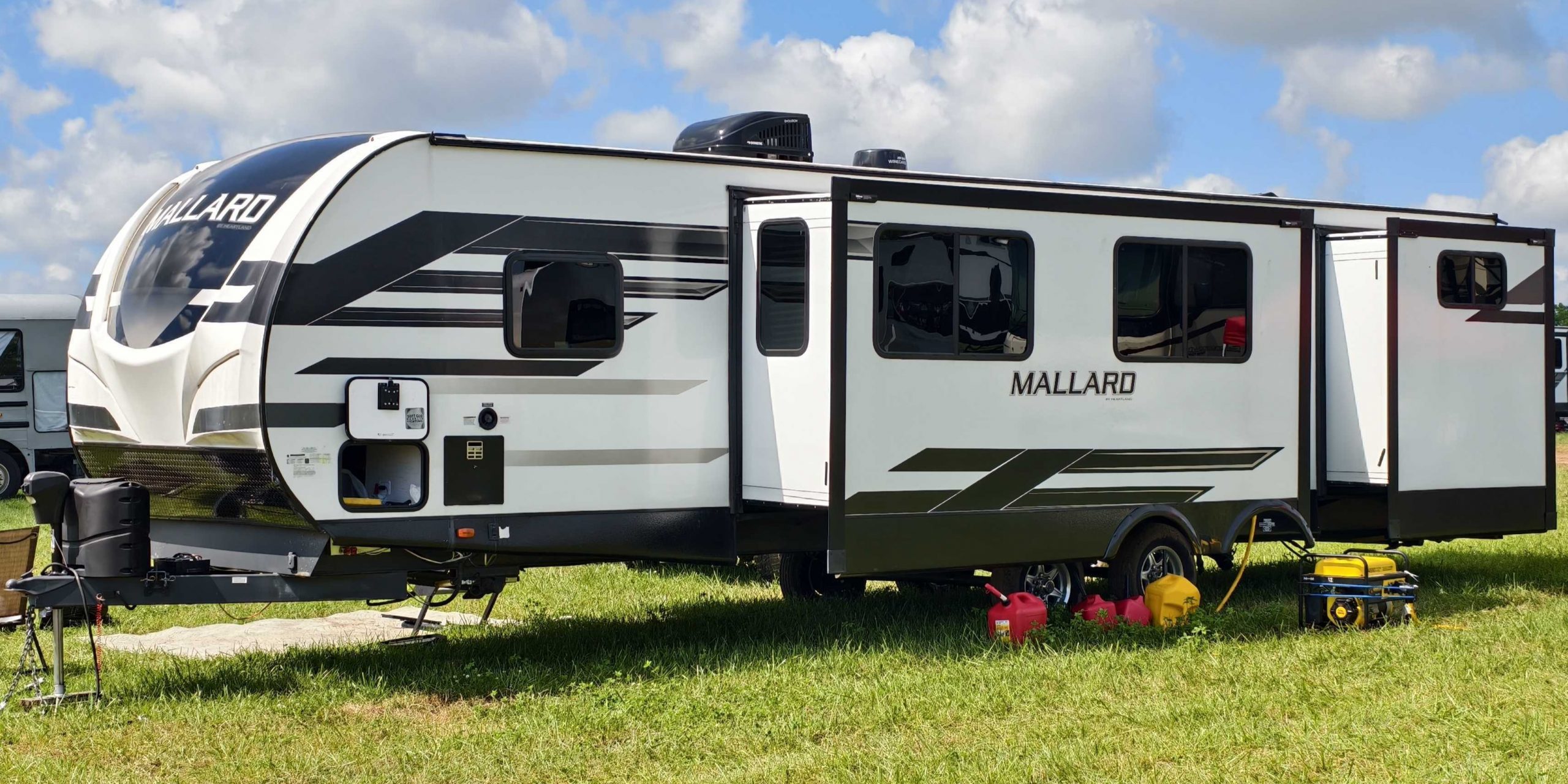
Alright, so what are my options, I wondered. I tried moving the generator to the middle of the camper on the left side, but this kept my Mom awake. Moving the generator to the back kept my Dad awake, with the added bonus of pissing off my campsite neighbors. Putting the generator on the right side pleased everyone, but meant that I couldn’t stargaze with any serenity because there was a loud generator right behind my chair.
I was standing outside, sweating and scratching my head, when I witnessed something fascinating. Across the street was a guy with a generator even louder than mine. I watched as he leaned a bunch of boards against the generator, and in an instant, it became quieter. I was shocked and asked him about it, and he directed me to a video:
The fella said he’s been using this method for years, and it hasn’t failed him. As it turns out, this is a thing. People have built enclosures for their generators out of plywood or out of insulation material. There are even commercially available generator noise barriers.
Here’s a fantastic video testing DIY generator enclosures:
What’s neat is that, if you make the enclosure correctly, it seems like the generator should be able to keep itself cool. The only real downside is that now you have to lug both a generator and an enclosure with you.
The logic being used here is that sound travels in waves, and if you give those sound waves something to bump into, many or most of the sound waves will bounce off. So, you build an enclosure and face the opening in the direction least likely to piss someone off. Or you buy one of those generator bunker things.
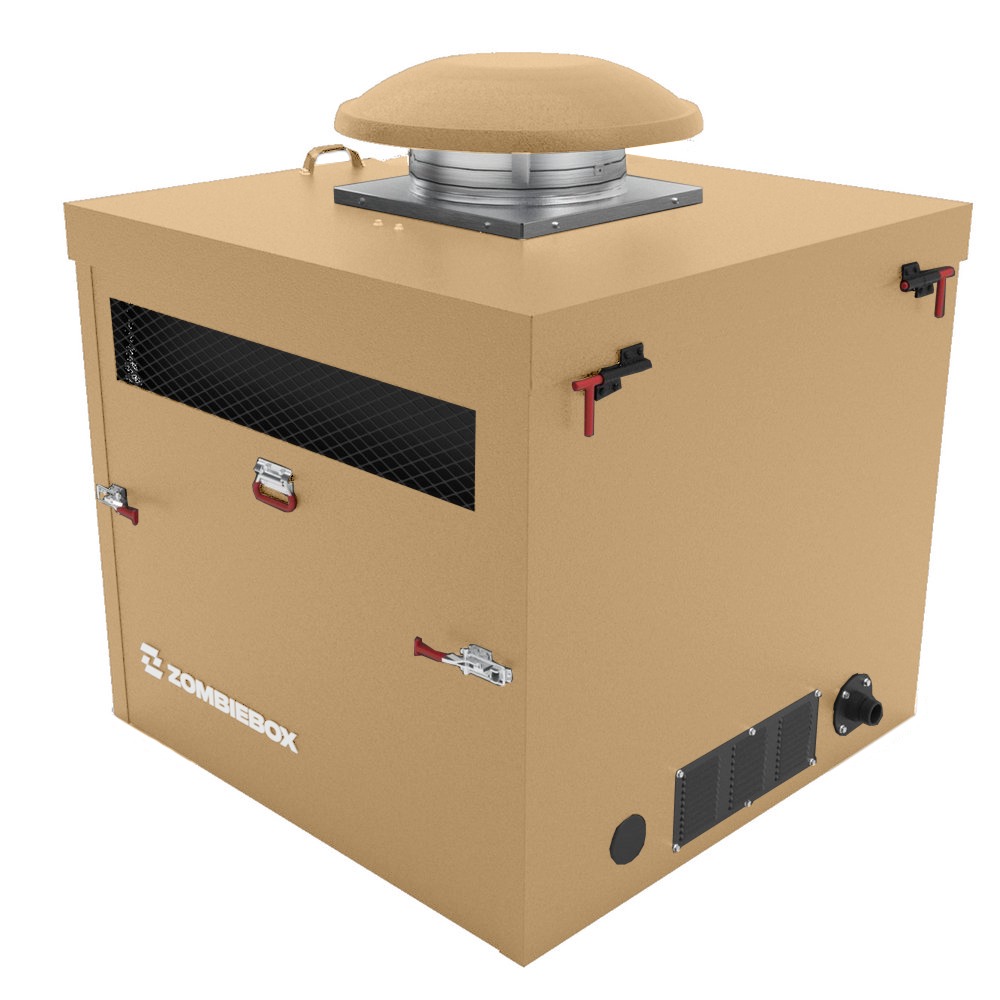
I ended up covering my generator with folding tables and then blocking it with the truck, which made a tremendous difference, but that can’t be my solution in the long term.
Quieter Generators
Another method is to buy a quiet generator in the first place. Several brands sell what are called inverter generators. Earlier, I said that basic generators work by turning mechanical power into AC power. The problem, aside from the noise, is that the electrical output isn’t cleaned up (more on what exactly needs cleaning in a moment). This doesn’t matter that much for something like a camper, but sensitive electronics will care.

Wen Products, a producer of power tools, explains what makes an inverter generator different:
The alternating current (AC) power produced by the alternator is sent to a rectifier, which is a device that converts the AC power to direct current (DC). This DC power is then inverted back to AC power by the computer inside the generator before it is sent to the control panel. This is where the name “inverter” comes from. Because the power to the control panel is controlled by the computer, inverter generators offer much lower total harmonic distortion (THD) than standard generators. THD is an important consideration when powering sensitive devices, like smartphones, tablets, computers, and televisions. These devices expect “clean” power (power that has low THD, like the wall power in your home), and can be damaged if they receive high-THD power. All WEN inverter generators use pure-sine-wave inverters, and as such, limit THD to under 1% in most cases. Traditional generators can produce THD as high as 25% in some cases.
Inverter generators are generally more compact than traditional generators, and are much quieter, but have lower maximum power outputs and are more expensive. There are two main sub-types of inverter generators: closed-frame and open-frame. Closed-frames are the most compact type of inverter generator, as well as the quietest. Their protective shell contains noise-absorbing insulation, significantly reducing their acoustic impact. They are usually portable and suitable for powering small loads. Open-frame inverter generators have no such insulation, and therefore are louder than closed-frames, but are still quieter than standard generators – usually about 50% quieter. Open-frame inverter generators produce power that is just as clean as closed-frame inverters, and may be capable of handling larger loads.
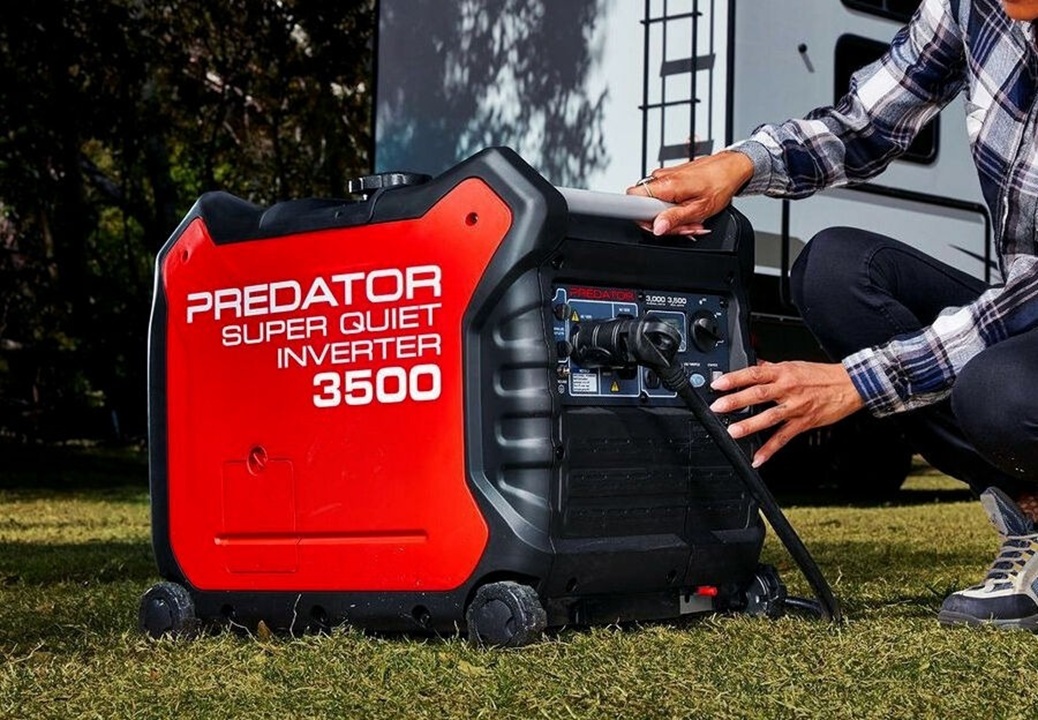
The rub is what Wen noted above: Inverter generators tend to put out less juice (albeit clean juice) for way more money. Some of the quietest generators that I know come from Honda. The camper parked next to ours ran a Honda EU2200i that was so quiet, I had to focus to hear it over the background noise of an air show. Yet, the EU2200i produces only 2200 watts for $1,099. That’s a lot more money and a lot less power compared to my $350, 3,650 watt generator.
So, for some, quieting down a cheap open frame generator is the way to go. However, some of the generator enclosures out there are crazy expensive. Unless you build your own enclosure, buying an inverter generator might be the better choice. To give you an example, a ZombieBox full enclosure will cost you at least $1,399, and even the company’s three-sided box will hit you to the tune of $259.
All-Electric
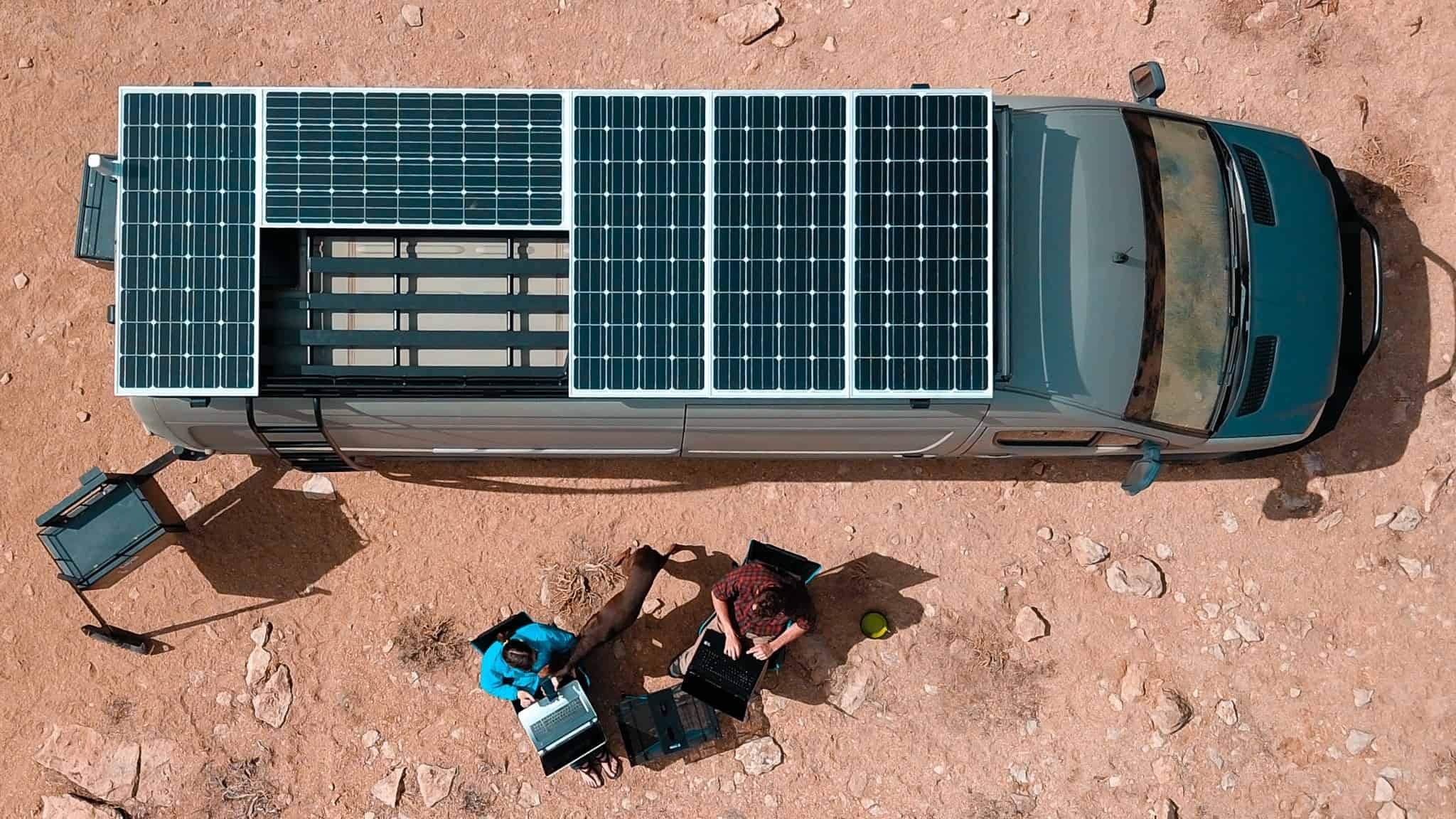
Alternatively, you could ditch the generator entirely in favor of battery power and solar panels. If you’re not interested in building out your own setup, you can buy RV solar panel kits for under $1 per watt. Of course, you’ll want batteries to store this energy, too. To give you one example, Renogy sells a 12V 300Ah deep cycle lithium battery for $900. This is also an expensive option.
Also, you’re not going to run a standard RV air-conditioner on 12-volt lithium batteries. There are 12-volt air-conditioners out there, but you will need a lot of batteries to be able to run the air-conditioner around the clock like you can with a generator. Depending on who you ask, a typical 13,500 BTU RV air-conditioner runs at 1,250 watts to 1,800 watts, but may require as much as 3,000 watts to start, so you would need a huge battery system to run one for a long time. There are 12-volt air-conditioners on the market, but high-powered ones might run you more than $2,000 and still require lots of power.
Another thing to consider is that, in the real world, your solar panels won’t produce the exact advertised number. Factors determining energy capture include clouds, pollution, temperature, sunlight angle, dirt, shade, or other roadblocks. Because of this, solar panel company LensunSolar claims your panels actual output might be 60 to 75 percent of their rated power.
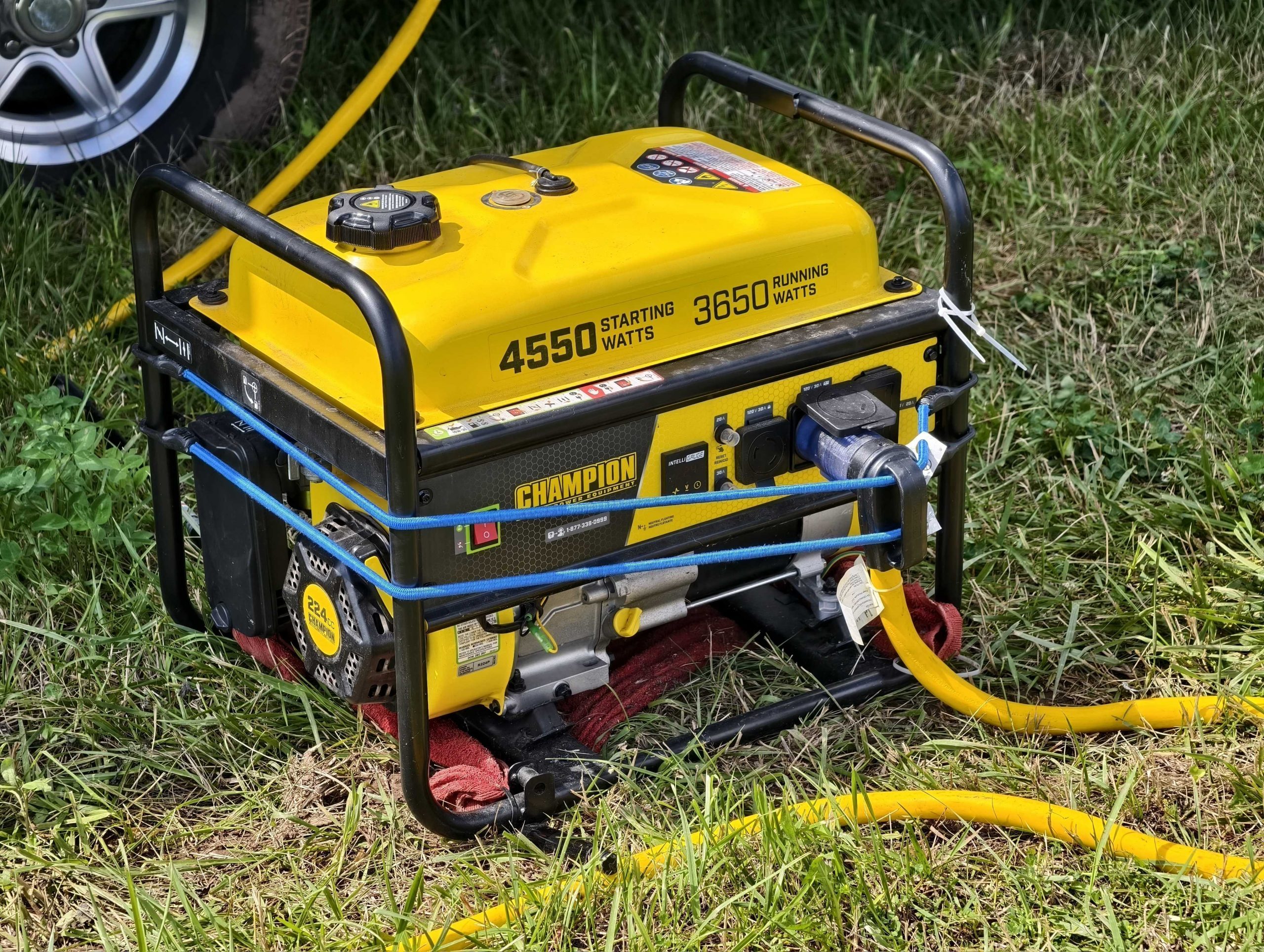
That means buying more solar panels than you think you might need. Say you want to run a 75-watt device for 12 hours. 75 x 12 = 900 watts. You’ll need a battery with at least 900 Wh and around 1,200 watts to 1,500 watts in solar if you intend to recharge the battery. That’s only matching your expected output for running the bulb for 12 hours. You’ll need to go even bigger if you intend to run more.
But if you can afford it, going all-electric is the ultimate way to kill noise. I think I’m just going to get an inverter generator and split the difference. Maybe move the Champion on to a new owner with the caveat that it should not be used for camping despite having an RV plug.
Update: I forgot to mention that, while I did have an EV with me, I did not have an adapter to interface between the truck and the trailer, nor was I able to find one locally. So I used the truck to charge mobility scooters, my power station, and other appliances.
No matter what you choose, don’t make the mistakes I have. Try not to be the person in a campground running a loud jobsite generator without any sort of care. If you don’t want to build or buy an enclosure, just block the generator with your truck, some plywood, or even a couple of tables. You’ll be amazed how much a small change makes a difference! But it’s best not to get into the situation in the first place, so maybe don’t be a cheapskate like I was.

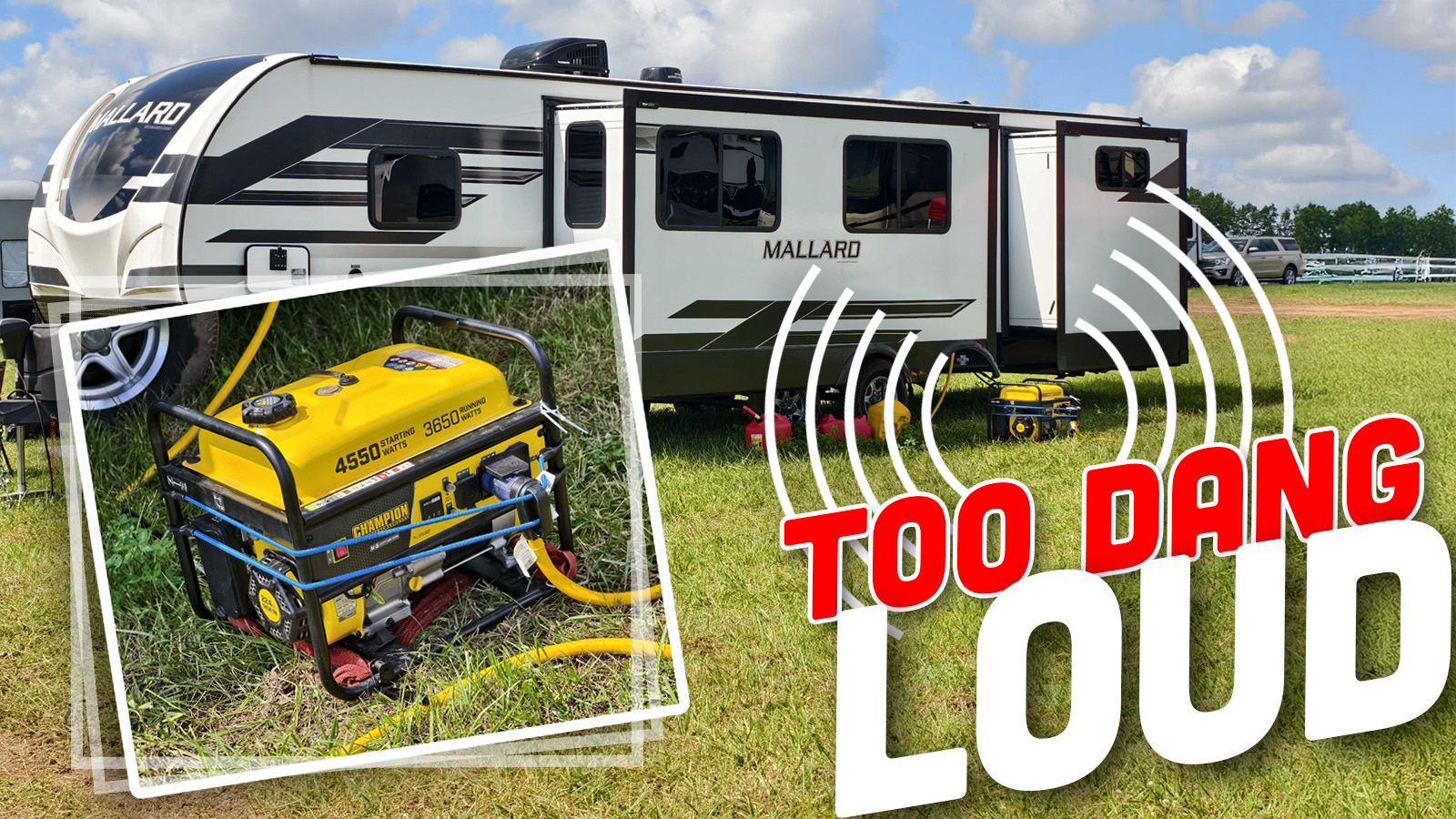







Most of these points have been touched on somewhere.
The biggest advantage to the EUs is fuel efficiency.
They can be paired together or run separately, very useful.
The 2200 is the most for the money, but has no electric start.
It is about the largest you want to drag around by yourself.
I have been told you can pair dissimilar Honda EU models together.
Honda says no though.
You can make your own wiring connectors and connect larger fuel tanks to any of them.
I have never been able to get my generator WiFi to work.
Two EUs paired together can be much quieter than one as they throttle down.
Probably more efficient than a single running harder too.
I get six to twelve hours per gallon.
The construction of the engine matters a lot.
I’ve slept next to an 80 KW diesel generator quite peacefully.
Had to be solidly built.
Acoustics and baffles
Most soundproofing is done with isolation and reflection, not absorption.
The mass density rule says the denser the material, the less sound passes through.
So glass, concrete, rock board, etc is ideal.
When you need portable though, exterior grade plywood may be your option.
Get something without gaps in it.
Decoupling surfaces is an additional approach, layers glued softly, no screws or nails. Mdf, soundboard, etc.
Trash carpet is often used as a cover.
Test both ways.
Ideally you want to direct sound upward where open air can damp it.
You may want to angle your baffles.
Sandbags are excellent also.
EUs come with rubber blocks under them.
If you don’t have that, dense rubber can help.
The fibreglass brick boards mentioned are excellent, but very costly.
Honey, give yourself some grace. It could be worse. You could be the person that gets a Micky D soft serve cone while their soft serve ice cream thingy actually works again for 45 seconds and then breaks after making your cone. You could be the person that breaks the slurpee machine at the 7-11. Trust me dear, there are many, many, worst offences you could commit against our spoiled ass society than a Loud generator to save the food in the fridge, no big deal. Your good my friend.
It’s not something I thought much about, but WTH don’t they sell bigger mufflers that can be added?
Anyway, you could definitely make your own enclosure for pretty cheap, which is all I would do. You only need a box with 5 sides with some vents for intake and exhaust and you can use some toggle clamp latches or similar to make it collapsible for storage and so you can set it up with one side open in case of heat issues as I don’t know how much heat the generator throws. From there, you could experiment with adding insulation, if needed, keeping in mind the heat build up. I imagine there’s some for sale you could kind of copy much of the design for as far as heat management and size goes.
The reason they don’t is the existing mufflers are typically very good already. Most of the noise from an open frame generator is mechanical noise from that cheap single cylinder engine flapping around, hence why enclosures help.
If you look up the exact engine, you can often find the best muffler made for it, inevitably the generator muffler.
But yours may not have the good one.
And you can fabricate quieter systems, but noise does come from other sources.
Mercedes, Eco Worthy sells 560AH 12V packages (2 x 280AH) for under $800. I just bought them, so I’m rather certain about it. I’m building a 24V portable power system.
It should weigh about 150lbs total and hold about 7,000 watt hours.
I’m so tired of hearing that old yarn about “sensitive electronics” being harmed by “dirty power”. It’s complete bunk. Here’s what happens inside a modern power supply for these delicate silicon contraptions:
1: The power goes through a common mode choke and bypass capacitors to filter out EMI.
2: Next comes a bridge rectifier (and sometimes active rectification if you’re getting fancy) which turns it into the world’s ugliest DC.
3: Then it goes into a constant current boost converter which ramps things up to a relatively clean and filtered 300-400 volts DC while keeping the rectifier diodes (near) constantly conducting.
4: Then it goes into a buck converter, which by some electrical wizardry of turning things back into high frequency AC and then into DC again, drops it back down to 5, 3, 12, 20 or whatever volts DC that the device needs, which is again filtered out to be buttery smooth and ripple-free.
These power supplies are designed so that no detectable amount of EMI or harmonic distortion makes it from one side to the other, in either direction. You can plug them into darn near anything that provides enough-but-not-too-much voltage and they’ll run like a champ.
No, sorry. Have you ever plugged a wall wart into a square wave inverter? It will get hot fast! And power factor correcting power supplies will just turn off when fed a square wave. You so obviously know your stuff, so honestly I’m a bit baffled. Just try plugging a PFC supply into a square (modified) wave UPS and pull the AC. I had to buy all new UPSes when I switched to PFC power supplies for my servers.
Furthermore, I am an audiophile (self assigned, not official in any way) and I do have to say that there can be a noticeable difference in sound quality when fed cleaner power. I was skeptical of such at first, and still find it a twee illogical that it should make a difference, but nonetheless it does. All I can say is that the human ear and brain are amazingly sensitive electrochemical processors.
There are numerous cases of someone upgrading the power supply and amps performing better, even McIntosh etc.
Worth the effort?
Maybe. Won’t hurt though
Old style transformer-lump wall warts will get hot due to harmonic distortion, yes. But hose wall warts are garbage in the first place; that self-heating characteristic is why virtually nobody uses them anymore (it’s still a problem at 60hz, just less noticeable). And yes, some cheap/early active PFC circuits would get confused when hooked up to especially messy inverters, but any modern, half decent one will be just fine.
As for the audiophile stuff: I’m happy that you’re happy. I’ll leave it at that.
Rounding a square wave wastes energy by turning it to heat. Heat is the enemy of electronics. This is why a true sine wave is better. These are just facts. Otherwise Nikola would have just used a simple polarity reverser switch in lieu of a commutator. The smooth rise and fall gives a flow of nice gently increasing pushes and pulls instead of constant hammer blows.
Feel free to discuss sound equipment with me anytime. It’s all subjective, but if you believe all equipment sounds the same, it would be pointless. I’ve been forced to accept that single-ended triodes really do sound better than anything else and that silver does indeed sound different. Both were in direct opposition to my assumptions.
We should talk sometime
I’m honestly surprised that Caravan/RV manufacturers haven’t designed generator enclosures into their cabins, with sound deadening and airflow solutions.
There is nothing worse than turning up to a national park with a tent, and then having to listen to someone’s generator screaming all night.
Some have. Plenty of more expensive RVs have integrated generators that are enclosed and quiet.
The best generators come with enclosures and water cooling.
$$$
Thanks for the tip on using boards. We have a big cheap Champion jobsite generator so we can pump stock water during power outages. I’ll try leaning some plywood slip-sheets against it next time we run it.
There’s some debate about using inverter generators with well pumps, because of the starting amperage needed. Also, 240V inverter generators are kinda pricy anyway.
Adding solar is fun to think about. A bigger Anker or whatever “solar generator” paired with rooftop panels could work pretty well, you just have to work out whether there’s enough insolation (equivalent hours of full sun) where you’re going. You should get 5+hours insolation there, multiplied by ~1600W of panels is 8kWH which is enough to run that A/C at 50% duty cycle overnight.
And heck, check out Greentec Auto and go down the rabbit-hole of DIY power banks repurposed from EV traction batteries.
Inverter generators run quieter and run longer on a tank of fuel because they can actually throttle down when less power is needed (which is often).
A traditional generator has to run at 3600 rpm all the time because the mechanical rotation is directly what results in the AC frequency.
Inverter generators’ have variable mechanical AC output, but by converting to DC, then back to AC, the final output frequency is controlled by the computer. As long as it’s generating enough power, the computer will put out appropriate 60Hz AC.
This means that when you need less than the full 18Amps (for 2200W) or whatever, the inverter generator can throttle down and run at a slow speed in a lower power mode, only generating the 1 amp or whatever you actually need; while still putting out 60Hz AC.
My Yamaha 2000W inverter generator has a 4.2L(1.1Gal) tank, and it will run at least 10 hours only powering my refrigerator and charging a few phones.
But which is more efficient at constant 80% load? I have a 4,000 watt 26 YO Honda magnetic generator which is actually pretty efficient under load compared to my eu2000i. The older Honda also has an auto-throttle which helps a bit. However, it weighs about four times the eu2000i.
No idea.
I don’t have an application that requires full 80% load 24/7.
I suppose technically at 100% load, the inverter would have conversion losses that the magnetic wouldn’t have. Anything less than 100% it’s a tradeoff between conversion losses, versus inverter throttling down a little.
However, anyone powering their house, RV, or similar will not be running at load 24/7. Air Conditioning switches on and off, heat switches on and off, refrigerators switch on and off… and unless they are very inefficient or poorly insulated, they will run probably 50% or the time or less.
Out of curiosity, what do you run that pulls a continuous 80% load?
It’s a hypothetical! Jeesh.
However, I have run both types for extended uses and found the magnetic one was more efficient than I would have assumed compared to the inverter. It’s not as obvious as one might generally think. That was all I was suggesting.
Your technical considerations were excellently stated and exactly what I was talking about. When powering a whole lot of stuff, load cycles smooth out considerably. I noticed, for instance, that all the iron in a magnetic generator’s core helps smooth out current demands versus inverter types. It becomes obvious when things like a refrigerator compressor kicks in.
My magnetic one also consumes vastly different amounts of fuel depending on load, just like an inverter version would. It takes less throttle opening to maintain RPMs without a load.
I wasn’t challenging you with anything more than a thought and some anecdotal observations.
For what it’s worth, I’d always choose an inverter version for camping, but powering a house is not as obvious a choice to me.
I wasn’t upset or critical. Sorry if I came across that way.
No need to apologize. Especially to an asshat like I. 🙂
Six to 12 hours running a Honda EU on a gallon of gas.
Can run longer.
Get a Honda. Sorry, but, Duh.
And just to avoid confusion, magnetic generators all produce true sine waves, albeit with some frequency variations. Inverter generators produce either modified or true sine waves depending on their quality. The truest sine waves you can get are always best, as modified ones (squared off) can and will damage much electronic equipment, especially power supplies.
Honda’s are usually quieter because they pay special attention to intake noise, whereas most everyone else just focuses on the exhaust.
I had a diesel generator for my bus briefly that was so loud I could hear it inside my house with it in a brick shed 75 feet away. It was wildly loud and not acceptable to camp with.
Got a 4500w champion enclosed inverter generator (same as the predator ones) but could only run 1 ac. It was super quiet though.
Now I have an 8k open frame inverter generator. It’s a bit louder but I made a flat folding foam board enclosure that can wrap around it and it keeps it quiet enough to be acceptable.
Even more reason for a hybrid RV. And even more for one that can tow a RV trailer. We use or Rav4 120v output to power our house when power goes out. Having a vehicle that is designed for being quiet, provides 120v power, and is maintained regularly is really handy, and having one that is a Sprinter-scale vehicle is really needed.
How many watts does that 120v outlet put out though? Can’t imagine it being more than 200w. Using it to run a fridge?
Toyota claims 1400w or is it 1500w. The inverter I used to use when attaching it to our Prius is a 1300w. The only thing we can’t run is the big fridge. We have a small fridge for insulin. We do have piped in water and gas, so lack of electricity is more of a nuisance than a problem.
I bought a big generator to run my house last year after another storm knocked my power out for a week (yay Houston). It was so loud I felt bad running it during the day, let alone at night.
I’m guessing yours is sized to run your A/C? That’s the big draw…I have a relatively small one that can power everything we need in the winter (including the gas furnace), but all bets are off in the summer.
Yeah, I bought one that does 13,500 watts. As its Houston being able to run the AC when losing power after a hurricane was something I wanted to be able to do. This one was supposed to be just a stopgap until I could spring for a whole house. But then I moved.
Look into a Kohler whole-house. They sell water cooled 4-cyl models that are as quiet as a car at idle.
Most residential generators (Generac) use air-cooled lawnmower engines and are loud as hell. They also don’t do very well cooped up in a big plastic box in places like Texas during the summer.
The Kohlers are quite a bit more expensive, but they will last. Look at any local telco utility drop (usually little square brick buildings in residental neighborhoods) or cell tower sites. They ALWAYS have a big metal box that says Kohler on the side. They use them because the work.
I decided it was cheaper to move somewhere away from hurricanes
I had a cheapo Coleman that I used in AZ- that thing was like a jackhammer and a quartet of leaf blowers combined, I gave it away saying it runs great but I will not be responsible for your murder if you use it in a campsite.
I could not imagine bringing a cheap-shit generator to a campsite and running it full blast all night. That is a serious dick move. Maybe go all-in and get some crazy bright LED spots to run all night while you’re at it. I can’t imagine doing this much less confessing it to an audience. Seriously.
Spending an absurd amount of money on a giant trailer and then being to much of a cheapass to pony up a little more for an inverter generator is big trailer park energy right there. May as well just go camping in a Wal-Mart parking lot if you refuse to be inconvenienced in the smallest way.
I wish I had more hands so I could give this more thumbs down.
Show us on the dolly where the bad generator touched you.
(Not judging you, just remarking on your passion!)
I suspect everyone that has spent a night in a campground has a similar experience. There is always someone in a giant RV, that you never see outside. Just the glow through the window from the TV and roar of the generator that to keep that giant RV frosty.
It is a giant middle finger to everyone around.
My own camp had a generator with so much resonance and nvh I cheered when it died.
I have yet to hear anything remotely as bad since then.
I have slept in a working machine shop before wearing shooting earmuffs.
This was worse.
Judging is totally fine, I’m here for it. I speak from my high horse as I specifically bought the Champion inverter generator as I used to live in NC and expected power outages from storms. It’s not a whisper quiet as the small honda generators, but it’s really very civilized. I think if most people had the opportunity to experience the two side by side, NOBODY would willingly buy the non-inverter. The difference is tremendous.
I have a Wen inverter generator for hurricane season. Since I live in a sort of tight community noise was a consideration for me and I ended up buying the cheapest inverter I could find on Amazon. It actually works great, it’s not the most powerful and won’t run my AC but it’s enough to power the fridge, TV, and a fan or two. It runs about 10 hours on a tank with that load and is quiet enough that we can’t hear it inside just 20-25′ away.
The best part though is in the owner’s manual, in the section regarding unpacking it:
I always loved that bit. I assumed whoever translated that knew their bosses didn’t read English so they slipped that in there. Either way I enjoyed it enough to hang onto the manual.
That’s a great story that, if enough people read their owners manuals, would be more common.
I don’t recall specifics like you do, but I’ve seen such things several times before and very much appreciate being reminded of them.
That is hilarious!
I have a pair of A-ipower 2300 watt inverter generators that come with the paralleling cord. My trailer is a 30A hookup, so these are perfect. One generator is all that is needed if I’m not running the AC, but I put both on when I need AC. 2 generators seems a little silly, but it’s way easier to lift in and out of the truck. Plus I can just run one with I don’t have the AC going. If I put a soft-start on my AC unit, I’d probably be able to get away with one generator. I picked them up for $299 each on sale last year at Sams Club. They are no Honda as far as quietness, but they are way quieter than the Champion. I have an old Champion generator too that I use for a house back-up, and it’s probably 20 years old now, but it still runs like a champ when I need it. But I can’t imagine camping with it.
The non-inverter gens are all too loud. My motorhome has a 4kw “Micro Quiet” unit and if that’s the quiet one, I’d hate to be around a regular one. I added 1kw of solar panels and ~5kwh of batteries (2*14v*200ah) just so I don’t have to listen to it.
Unfortunately, while it may always be sunny in Philadelphia, it usually isn’t wherever I’m camping so I do have to run it occasionally to let the inverter/charger do its thing to get me juice.
If the gen ever dies out, I’m replacing it with an inverter Harbor Freight unit of some type.